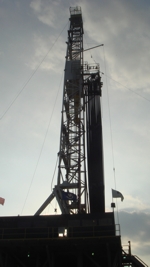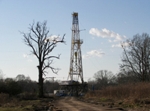
CV Discovery (MS)

Sligo Discovery (MS)
IT'S IMPORTANT FOR LESSORS TO UNDERSTAND SOME BASIC FACTS ABOUT LEASING
Many private mineral owners have told us that they would like to learn more about the leasing process and how they can encourage prudent exploration for oil and gas on their mineral holdings with minimal environmental impact and maximum financial gain. In addition, some mineral owners who have been contacted by one or more of our lease brokers might be naturally curious about Vision Exploration, our background, and our reasons for offering to lease their minerals at the terms that we've proposed. We have taken this opportunity to address some of these topics in a brief, informal manner. If you have further questions, you are always welcome to contact us and discuss any issue in more detail. We would also ask that you please take a brief moment to read our Disclaimer. Thanks for your interest.
Our Brokers
Perhaps you have been contacted by one of our lease brokers, veteran landmen who have been carefully selected by our Land Department for their honesty, integrity, and experience in our areas of interest. We hope that you will always find them to be courteous and respectful of your privacy and property. If they are not, call or contact us immediately. Please allow us the opportunity to promptly address your concerns.
Our Lease Form
Vision Exploration LLC provides its lease brokers with a modified version of a standard lease form to submit for consideration by mineral owners and/or their attorneys. The modifications address the prevailing lease bonus consideration (i.e., the typical cash payment) per acre in your area, the prevailing mineral owner royalty in your area, and the term (duration in years) of the lease. Different areas have different prevailing lease bonus considerations, royalty, and term - depending on the level of interest in the area, the success rate of oil and gas exploration in the area, proximity to problem areas such as urban development or protected lands (such as parks, national forests, etc.), and other environmental or legal restrictions. For example, if you are contacted about leasing your minerals in an area that is far removed - say, over 100 miles - from any known oil and gas production (i.e., a "frontier" area), it's a safe bet that you will be offered less bonus and royalty and asked to agree to a longer lease term than if your mineral holdings were in the middle of a very active, producing trend.
We Need your Help
Consider this hypothetical scenario: Your great-great-grandfather acquired your family's land and mineral holdings over 100 years ago. He had four children. They inherited the minerals. All four married, had children, and two later divorced, remarried and had more children. They divided their share of the mineral interests among all of those children. Then those children grew up, and had children of their own; some went on to get divorced, then later remarried, and had more children. And so on. Along the way, records got lost, deeds were misplaced, disputes and feuds arose. Some family members sold their land and minerals to outside parties. In time, many family members died, some having failed to prepare wills; their children squabbled over who inherited what, but no one was really sure of what they were legally entitled to. And, of course, they had more children, got divorced, remarried, and so on...
By the time you inherit your share of your great-great grandfather's original mineral holdings, you're not exactly sure what you've actually inherited. All you know is that your mother thinks that you're entitled to a 2% ownership in the "old Home Place" - but your second cousin is convinced that he owns it, too. You've never seen the actual deed or the will that gave you title to the minerals, but you've been told that your Uncle John has been keeping up with it, and he says that it's somewhere down at the courthouse...
Now put yourself in our place. At great financial risk, we've decided to attempt to lease an area that includes your great-great-grandfather's original mineral holdings (the old Home Place). We go to the courthouse to try to determine exactly who owns the rights to the minerals in the area. What we find is 40 to 50 individuals that claim to own some interest (exactly what, they're not sure) and evidence of "clouded title" - great uncertainty regarding actual mineral ownership. Being optimists, we spend weeks in the courthouse and pay brokers and lawyers thousands of dollars to study the courthouse records in an attempt to determine the chain of mineral title for the property. Finally, when we think that we have identified a key family member, we attempt to contact him or her, often only to find that that person is uncooperative or reveals additional information that indicates that the title to the land is severed (subdivided) even worse than our preliminary investigations had suggested.
Faced with high legal bills and a seemingly insurmountable obstacle to our lease efforts, we reluctantly withdraw from the area, and seek another area where records were better kept and the chain of title is clearly evident.
Meanwhile, you have another baby, as does your cousin, and Uncle John passes away unexpectedly, leaving neither a will nor any records as to who owns what...and so on...
The scenario that we've just described is a very real one. In much of the United States, the advanced subdivision of private mineral interests through inheritance, sale, and foreclosure has reached a critical point. In other words, private mineral owners in this country need to realize that clouded title and/or the existence of dozens of partial interest owners effectively drives away the very people who are trying to create value for everyone by attempting to lease and develop their minerals. It is getting to the point where large areas are comprised of mineral interests that are so severely "cut-up" that it costs more to pay the brokers and lawyers to figure out who owns what, than it actually costs to lease those myriad owners once the chain of title is successfully determined. If the trend continues, those factors will severely impact the value of such "cut-up" mineral holdings - because no oil & gas company is going to attempt to lease those minerals in the future.
What can you do to help?
It is always beneficial to have good records of the chain of title to your property, including copies of wills, quitclaim deeds, and other relevant legal instruments. And, if you do own a very small interest and are contacted via telephone by one of our land brokers, please remember that he is not a telemarketer, or conducting a survey - he is simply trying to lease your minerals and create value for you and your family. Your assistance and cooperation is not only helpful, it is often critical, and we appreciate any help that you can give us. Thanks in advance for your time. You will be the greatest beneficiary in the long run.
A Common Superstition
Contrary to a common mineral owner superstition,
energy companies do not discover a commercial (economic) reservoir
of oil and/or gas and then surreptitiously plug and abandon ("cap") the well
with the intent of returning to produce that same well (or "pool")
sometime in the future.
That makes no sense.
When a well is plugged and abandoned, it is done so at considerable
cost and often renders the wellbore uneconomical (or mechanically
difficult) to re-enter. The plugging and abandonment of a well
almost always means that - in the opinion of the investors that put
up the money to drill the well - there was not enough evidence of
producible reserves to support (pay for) the expensive process of
cementing casing and testing the well, let alone make a profit. This
second phase of wellsite operations - the "completion" phase - can
cost as much as 50% (or more) of the total cost to drill the well to
total depth.
If a company has spent two million dollars to drill a well to
total depth on your property, you can be assured that it will
carefully study the economics of what it has found before spending
another million dollars in an attempt to "complete" the well. If
nothing was found, or a very small reservoir was discovered, the
odds are very good that the company will be forced to abandon the
well. If the wellbore yielded enough evidence that commercial
quantities oil and gas were located not far from its location,
sometimes a company will sidetrack (plug back and redrill) the well
to that new target - but that is a rare and costly decision.
So if a well has been drilled and abandoned on or near your mineral
holdings, it usually is abandoned for sound economic reasons and
will have some - possibly great - negative impact upon enthusiasm
for additional drilling within a certain radius of that dry hole.
This is true even if that dry hole offered some encouragement in the
form of oil and gas "shows" - evidence that a hydrocarbon trap might
be found somewhere else in the vicinity.
Therefore, if you are subsequently approached by a lease broker who
desires to lease the mineral interests under or near a plugged and
abandoned well, you need to understand that he represents an
optimist who has decided to try his luck in the area, despite the
negative impact of the existing dry hole. You should want to
encourage such efforts, recognizing that some incentive - in the
form of more favorable lease bonus, royalty, and term - could
greatly assist that optimist in his efforts to overcome the previous
failure.
We Can Help You
Perhaps you are generally aware of these issues or appreciate this discussion, and are interested in encouraging small reputable companies like Vision Exploration to lease your minerals. Perhaps you simply have questions about activity in your area. We encourage you to contact us. All information discussed is held confidential - in fact, you don't even have to reveal your identity, or the location of the mineral holdings in question, if you don't want to. You may be as specific or vague as you wish in the provision of information; our answers will be correspondingly specific or vague. Some larger mineral owners might consider consulting with us on a regular basis, or as the need arises. At the end of the day, our goals and yours are one and the same: the creation of value from your mineral holdings for mutual benefit, at little or no cost to you, and with a sincere desire to minimize the environmental impact of our exploration and development upon your land.
Thank you for considering Vision Exploration LLC.